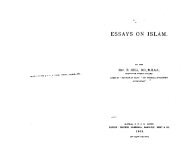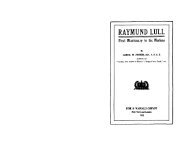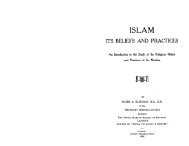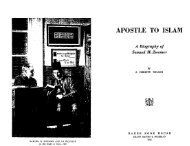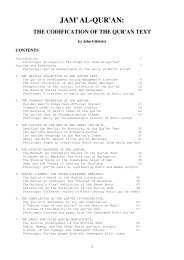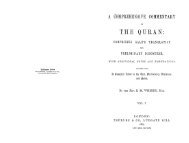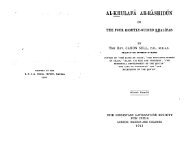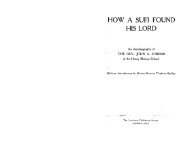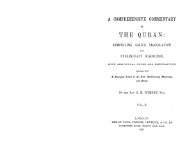Guillaume--Life of Muhammad.pdf - Radical Truth
Guillaume--Life of Muhammad.pdf - Radical Truth
Guillaume--Life of Muhammad.pdf - Radical Truth
You also want an ePaper? Increase the reach of your titles
YUMPU automatically turns print PDFs into web optimized ePapers that Google loves.
The <strong>Life</strong> <strong>of</strong> <strong>Muhammad</strong><br />
When on the march Iraq's wide plain<br />
Is theirs-moreover they read and write (36).<br />
He also said:<br />
If you ask me who I am, Lubayna, and <strong>of</strong> my line<br />
I will tell you the certain truth.<br />
We belong to al-Nabit the father <strong>of</strong> Qasiy<br />
To Man~iir son <strong>of</strong> Yaqdum (our) forefathers (37).<br />
They said to him: 0 King, we are thy servants attentive and obedient<br />
to you. We have no quarrel with you and our temple-meaning that <strong>of</strong><br />
al-Lat-is not the one you seek. You want only the temple in Mecca, and<br />
we will send with you a man to guide you there. He therefore passed on<br />
leaving them unmolested.<br />
As to al-Lat it w;;. a temple <strong>of</strong> theirs in al-Ta'if which they used to<br />
venerate as the Ka'ba is venerated (38). So they sent with him Abii<br />
Righiil to guide him on the way to Mecca, and when he had brought<br />
him as far as al-Mughammis' AbU Righiil died there and the Arabs<br />
stoned his grave. This is the grave which people in al-Mughammis still<br />
stone. z<br />
33 Arrived here, Abraha sent an Abyssinian called al-Aswad b. Mafsiid'<br />
with some cavalry as far as Mecca and the latter sent <strong>of</strong>f to him the plunder<br />
<strong>of</strong> the people <strong>of</strong> Tihama, the Quraysh and others, among it two hundred<br />
camels belonging to 'Abdu'I-Mullalib b. Hashim, who at that time was<br />
the leading shaykh <strong>of</strong> Quraysh. At first Quraysh, Kinana, and Hudhayl<br />
and others who were in the holy place meditated battle, but seeing that<br />
they had not the power to <strong>of</strong>fer resistance they gave up the idea.<br />
Abraha sent Buniila the Bimyarite to Mecca instructing him to inquire<br />
who was the chief notable <strong>of</strong> the country and to tell him that the king's<br />
message was that he had not come to fight them, but only to destroy the<br />
temple. If they <strong>of</strong>fered no resistance there was no cause for bloodshed,<br />
and if he wished to avoid war he should return with him. On reaching<br />
Mecca Bunala was told that 'Abdu'I-Mullalib b. Hashim b. 'Abd Manaf<br />
b. Qu~ayy was the leading notable, so he went to him and delivered Abraha's<br />
message, 'Abdu'I-Mullalib replied: 'God knows that we do not wish to<br />
fight him for we have not the power to do so. This is Allah's sanctuary<br />
and the temple <strong>of</strong> His friend Abraham-or words to that effect-If He<br />
defends it against him it is His temple and His sanctuary; and if he<br />
lets him have it by God we cannot defend it!' Bunala replied that he<br />
must come with him to Abraha, for he was ordered to bring him back<br />
with him.<br />
So accompanied by one <strong>of</strong> his sons"Abdu'I-Mullalib came to the camp<br />
1 Also written al-Mughammas, a place 'two thirds <strong>of</strong> a parasang' (roughly two miles)<br />
from Mecca.<br />
a The practice survives to this day,<br />
, Other authorities write MaQ1i1l1d. Maf~ud means 'slash-faced'.<br />
The <strong>Life</strong> <strong>of</strong> <strong>Muhammad</strong> 25<br />
~d inquired for DhU Nafr, for he was a friend <strong>of</strong> his. He went in to see<br />
h,m as he was i~ confinement and asked him if he could do anything to<br />
help them m theIr trouble. Dhii Nafr replied: 'What use is a man held a<br />
pnsoner m the hands <strong>of</strong> a king, expecting to be killed at any moment?<br />
I ~an do ~othmg to. help you except that Unays the keeper <strong>of</strong> the elephant<br />
bemg a fnend <strong>of</strong> mme, I will send to him and commend your case to him<br />
~ strongly as possible asking him to try to get you permission to see the<br />
~ng.. So speak as yo~ think fit, and he will intercede for you with the king<br />
If he,s able to do so. So Dhu Nafr sent to Unays saying, 'The king has<br />
taken two hundred camels belonging to 'Abdu'l-Mullalib, lord <strong>of</strong> Quraysh<br />
and master <strong>of</strong> the Meccan' well who feeds men in the plain and wild<br />
creat,?res on the top, <strong>of</strong> the mountains, and is now here. So ask permission 3"t<br />
for h,m to see the king and help him as far as you can.' He said he would<br />
d~ so and repe~ted these words to the king, adding that 'Abdu'I-MuHalib<br />
WIshed ~o see hlm,and t~lk to hi~ about a pressing matter. Abraha agreed<br />
t~ se~ hIm. Now Abdu I-MullalIb was a most Impressive, handsome, and<br />
dIgnIfied man, and when Abraha saw him he treated him with the greatest<br />
respect so that he would not let him sit beneath him. He could not let the<br />
A;byssinians see him sitting beside him on his royal throne, so he got <strong>of</strong>f<br />
hIS throne and sat upon his carpet and made 'Abdu'l-Mullalib sit beside<br />
h,m there. Then he told his interpreter to inquire what he wanted, and the<br />
rep.ly was that he wanted the king to return two hundred camels <strong>of</strong> his<br />
whIch he had taken. Abraha replied through the interpreter, 'You pleased<br />
me much when I saw you; then I was much displeased with you when I<br />
heard what you said. Do you wish to talk to me about two hundred camels<br />
<strong>of</strong> y~urs which I have taken, and say nothing about your religion and the<br />
relIgIOn <strong>of</strong> your forefathers which I have Come to destroy I' 'Abdu'l-Multa!ib<br />
replied, 'I am the owner <strong>of</strong>the camels and the temple has an owner who<br />
,,:111 defen:I it.' When the king replied that he could not defend it against<br />
him he saId, 'That remains to be seen.' ('Give me back my camels.') T.939<br />
Some learned people allege that when 'Abdu'l-Mullalib went to Abraha<br />
when he sent l;Iuna~a to him, there accompanied him Ya'mur b. Nufiitha<br />
b. 'Adiy b. al-Du'il b. Bakr b. 'Abd Manat b. Kinana, at that time chief<br />
<strong>of</strong> B. Bakr, and Khuwaylid b. Wathila, then chief <strong>of</strong> Hudhayl. They<br />
<strong>of</strong>fered to give Abraha a third <strong>of</strong> the cattle <strong>of</strong> the lowland on condition<br />
that he wo,:,ld withdraw from them and not destroy the temple, but he<br />
refused theIr request; but God knows whether this Was so or not. At<br />
any rate Abraha restored to 'Abdu'I-Mullalib the camels which he had<br />
taken.<br />
. When they left him, 'Abdu'l-Mullalib went back to Quraysh and having<br />
gIven ~hem t~e. news ordered them to withdraw from Mecca and take up<br />
defenSIve pOSItIOns on the peaks and in the passes <strong>of</strong> the mountains for<br />
fear <strong>of</strong> the excesses <strong>of</strong> the soldiers. 'Abdu'I-Mullalib took hold <strong>of</strong> the<br />
metal knocker <strong>of</strong>the Ka'ba, and anumber <strong>of</strong>Quraysh stood with him praying<br />
I<br />
C. has 'ir, 'caravan',



